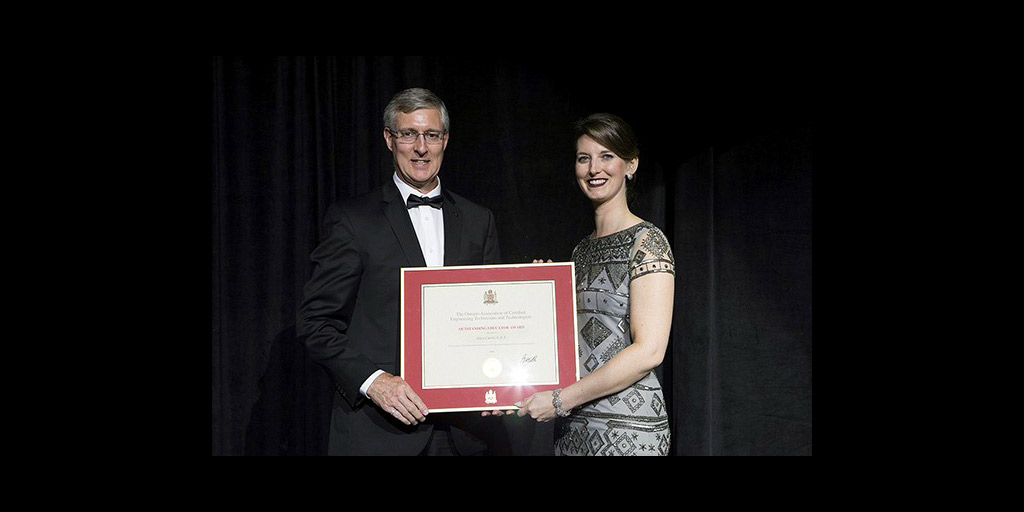Fanshawe's Gary Curtis, receives an Outstanding Educator award from OACETT
 CREDIT: ONTARIO ASSOCIATION OF CERTIFIED ENGINEERING TECHNICIANS AND TECHNOLOGISTS (OACETT)/STRANGEMORE
CREDIT: ONTARIO ASSOCIATION OF CERTIFIED ENGINEERING TECHNICIANS AND TECHNOLOGISTS (OACETT)/STRANGEMOREGary Curtis, Fanshawe College civil engineering professor, received the Outstanding Educator award at the Ontario Association of Certified Engineering Technicians and Technologists (OACETT) awards gala in October 2017.
Gary Curtis, a Fanshawe civil engineering professor, recently received a prestigious award for his contributions in educating civil engineering students.
According to a late November Fanshawe Corporate Communications press release, the Outstanding Educator award from the Ontario Association of Certified Engineering Technicians and Technologists (OACETT) is given to an individual whose contributions over the years has had a significant impact on the education and training of engineering students.
Civil engineering is a branch under the Donald J. Smith School of Building Technology at Fanshawe College, along with other programs such as architecture and construction project management. The program deals with designing infrastructure outside of buildings such as roads and sewers.
Gary Curtis worked in the industry as a civil engineering consultant for 25 years, before becoming a professor at Fanshawe in 2008. According to Curtis, the things he did while working as a civil engineer, he is now teaching his students. This includes being able to successfully design roads, sewers, subdivisions and such.
As a civil engineer professor, Curtis explained that he teaches his students essential programs that are used in the business such as Auto CAD, environmental technology about sewage and water treatment, and Civil 3D, an advanced modeling package, to teach how to design watermains and sewers.
“But really, I teach a little bit of everything really,” Curtis said.
According to Curtis, to receive the Outstanding Educator award, most of the time, an individual needs to be a member of the OACETT and nominated by peers, industry, students and co-workers.
“Those are the type of people nominating me based on the way I teach and the quality of students that come out of our program.” Curtis said.
When asked how he felt receiving the award both as a professional and personally, Curtis said, “I think in terms of being recognized, it's really significant. When you try to teach your students to be accountable, yet you want to be fair to them, and really tell them what is expected in the industry, that's what you are trying to teach. And when the industry comes back and says ‘Yeah, you're doing a good job,' from time to time it's nice to be recognized. I think that everybody whose worked for five years or nine years or ten years, you see people get tired if you don't necessarily have someone say every now and then, ‘Hey, pat on the back. You're doing a good job. Your graduates are coming out with the skills we need.' So that means you're relevant, you stay current and you are passing on that correct information. I think that it is important feedback to have from time to time to get,” Curtis said.
Curtis said that outside school he keeps in touch with graduated students and also keeps up-to-date on the current standards of the industry.
“I do that in a couple of ways. I'm on LinkedIn and I ask my students once they graduate, not while they are still here as students per se, but once they graduate to make we stay connected and keep in touch. So, I know where they are working and I can get some feedback from them time to time on maybe new things that they are seeing emerge in the industry. I also keep in touch with them at the Construction Association meetings.”
At these meetings, he explained, that many construction companies come together and meet monthly to discuss topics such as new health and safety measures that may be coming forward or about new types of equipment and materials that are available and being used.
“It keeps me engaged in industry.” Curtis said. “I am hearing and seeing new information that I can pass on to students while they are here at the school that they are probably going to see by the time they graduate.”
When asked if receiving the award has had any impact on his career, Curtis said, “I don't think so. It doesn't change who I am or how I teach. I still try to teach the best I can and to make sure my students are well prepared. I think it just encourages me to keep doing what I am doing.”














